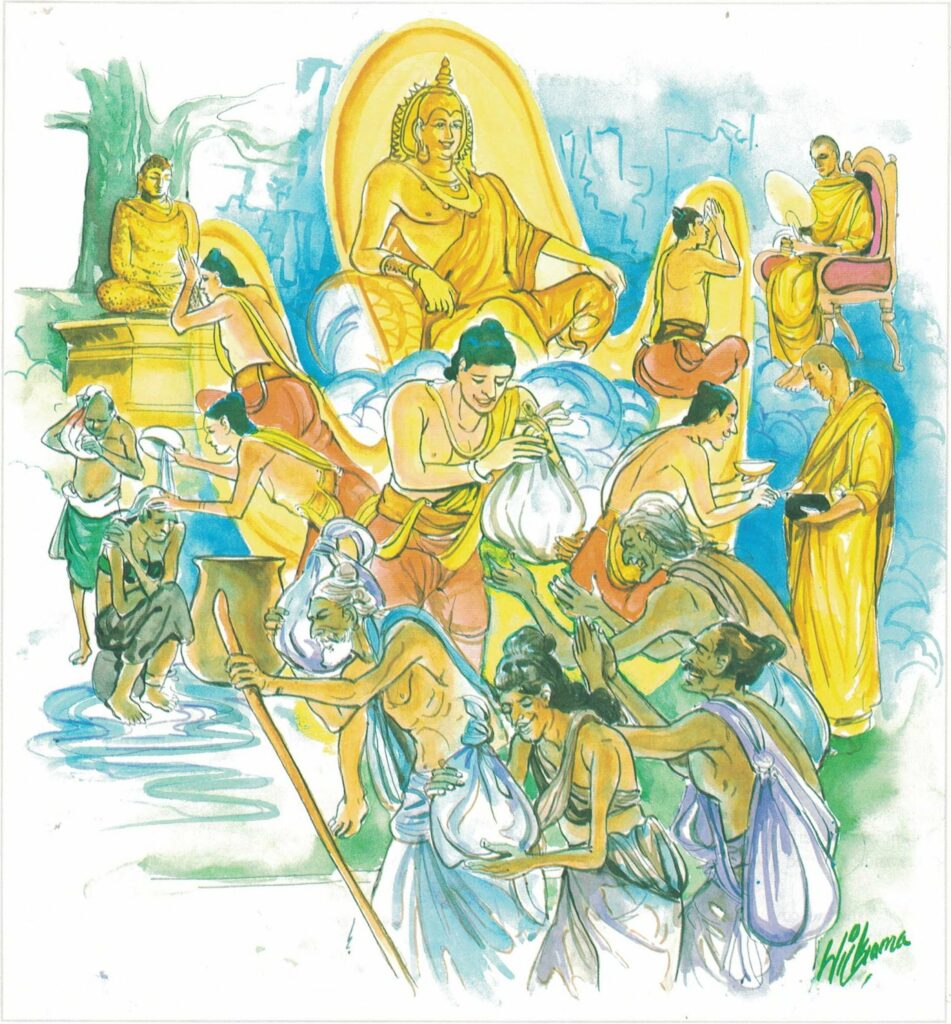Pali text, illustration and English translation of Dhammapada verse 68:
tañca kammaṃ kataṃ sādhu yaṃ katvā nānutappati |
yassa patīto sumano vipākaṃ paṭisevati || 68 ||
68. But well-made is that kamma which done brings no remorse, of which one senses the result with glad mind and with joy.

The Story of Sumana, the Florist
While residing at the Jetavana Monastery, the Buddha spoke this verse, with reference to Sumana the florist.
A florist, named Sumana, had to supply King Bimbisāra of Rājagaha with jasmine flowers every morning. One day, as he was going to the king’s palace he saw the Buddha, with a radiating halo of light-rays, coming into town for alms-food accompanied by many monks. Seeing the Buddha in his resplendent glory, the florist Sumana felt a strong desire to offer his flowers to the Buddha. Then and there, he decided that even if the king were to drive him out of the country or to kill him, he would not offer the flowers to the king for that day. Thus, he threw up the flowers to the sides, to the back and over and above the head of the Buddha. The flowers remained hanging in the air; those over the head formed a canopy of flowers and those at the back and the sides formed walls of flowers. These flowers followed the Buddha in this position as he moved on, and stopped when the Buddha stopped. As the Buddha proceeded, surrounded by walls of flowers, and a canopy of flowers, with the six-coloured rays radiating from his body, followed by a large entourage, thousands of people inside and outside of Rājagaha came out of their houses to pay obeisance to the Buddha. As for Sumana, his entire body was suffused with delightful satisfaction (patti).
The wife of the florist Sumana then went to the king and said that she had nothing to do with her husband failing to supply the king with flowers for that day The king, being a sotāpanna himself, felt quite happy about the flowers. He came out to see the wonderful sight and paid obeisance to the Buddha. The king also took the opportunity to offer alms-food to the Buddha and his disciples. The king served the congregation of monks with choice food. At the conclusion of the meal the Buddha returned thanks, and surrounded as before by four sides of flowers and accompanied by a great multitude of people shouting in exultation, proceeded to the Monastery.
The king accompanied the Buddha a little way and turned back. Then he sent for the florist and asked him, “What did you say when you honoured the Buddha?” The florist replied, “Your majesty, I surrendered my life to him and honoured him, saying, ‘The king may kill me or banish me from his kingdom.’” The king said, “You are a great man.” So saying, he presented him with eight elephants, eight horses, eight male slaves, eight female slaves, eight magnificent sets of jewels, eight thousand pieces of money, eight women taken from the royal harem, adorned with all the adornments, and eight choice villages. These eight-fold gifts did the king give him.
Venerable Ānanda thought to himself, “Shouts of exultation and acclamation have continued all during the day since early morning. What will be the reward of the florist?” The Buddha replied “Ānanda, he surrendered his life to me and rendered honour to me. Therefore, because he has immense faith in me, he will not enter a state of suffering but will receive the fruits of his good deed in the world of the gods and in the world of men. One day he will become the solitary Buddha Sumana.”
Explanatory Translation (Verse 68)
yaṃ katvā na anutappati yassa vipākaṃ patīto
sumano paṭisevati taṃ ca kammaṃ kataṃ sādhu
yaṃ [ya]: some act; katvā: having done; nā anutappati: one does not regret; yassa: of which action; vipākaṃ [vipāka]: the result; patīto [patīta]: happily; sumano [sumana]: with pleasant mind; paṭisevati: one enjoys; taṃ: that kind of action; ca kammaṃ kataṃ sādhu: is certainly good to be done
It is good if one were to do such actions that would not bring repentance later. One should do things that bring pleasant consequences.
Commentary and exegetical material (Verse 68)
patīto sumano: happily and with pleasant mind. In this instance, what is described is the result of good actions, which does not cause repentance. The doer of the action has had forethought about what would result from his actions. With that forethought he has done only those actions that will not lead to remorse.